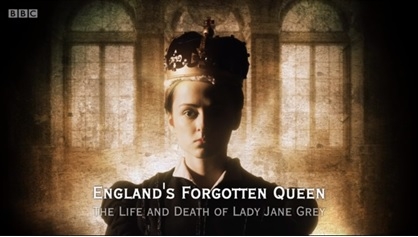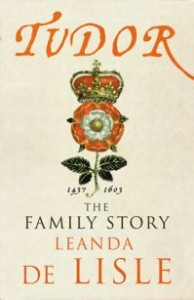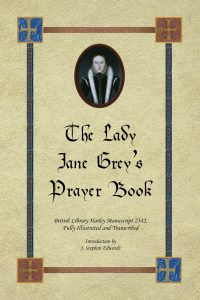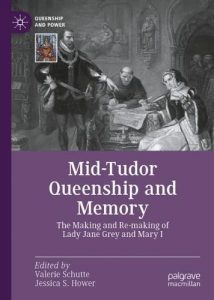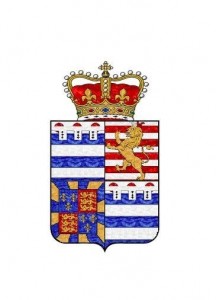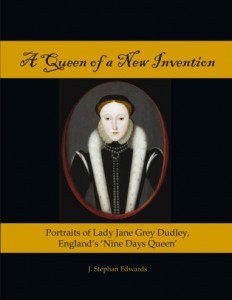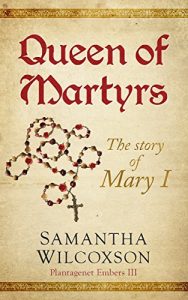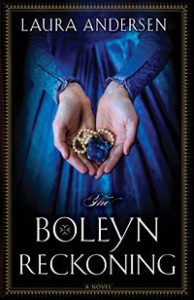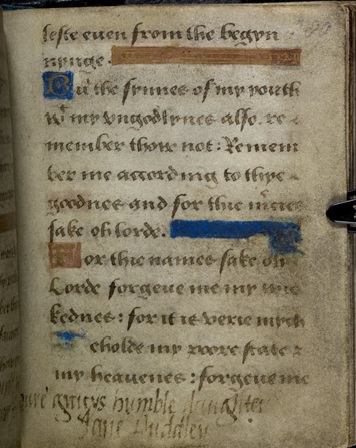Professor Eric Ives writes the following about the authenticity of Jane’s letter to her sister Katherine.
‘Seven other pieces attributed to Jane are known only in printed copies. They come from her months of imprisonment in the Tower and cannot automatically be taken as genuine…The others are a personal letter to her sister Katherine…’ (p.17, Ives)
‘…Suspicion might also appear to rest …on the account of her debate with John Feckenham. The government was intent on restoring Catholicism and these items were highly subversive, so how could they have escaped Tower security? But they clearly did because both texts were circulating barely a month after her execution. In a letter smuggled out to Bullinger and dated 15 March, a John Banks (part of the Grey circle) sent news of Jane’s death and Latin translations of the Feckenham dialogue and the letter to Harding and also the scaffold speech and the letter to Katherine Grey. Clearly he had publication in mind but Bullinger vetoed the idea for fear of exasperating Mary’s government still further. However, James Haddon, once a chaplain to Jane’s father, did assure Bullinger that although parts of Bank’s account were suspect because ‘he has gathered them from common report and being himself too in some measure biased by his zeal; when it comes to ‘what regards the Lady Jane herself, and what is said in her name, (as for instance, her exhortations to a certain apostate, and her discourse with Feckenham), I believe and a partly know, that it is true, and did really proceed from herself.’ Thanks to Banks and this comment by Haddon, the authenticity of the Feckenham and Harding pieces, and by association the Katherine Grey letter and the scaffold speech is beyond question.’ (p.21, Ives)
Ives describes how the letter appeared in print in England.
‘In 1554 there appeared An Epistle of the Ladye Jane, a righte virtuous woman to a learned man of late fallen from the truth, conjecturally from the press of John Day…In the same year or the next came ,‘Here in this booke ye have a godly Epistle made by a faithful Christian.’ Each pamphlet contains an English text of the Feckenham discussion and the letter to the ‘apostate’ which Haddon had warranted, plus the letter to Katherine and the speech from the scaffold which Banks had translated for Bullinger.’ (p.21, Ives)
‘The hint that more than one English text of Jane’s letters was extant is confirmed by her letter to her sister. The text in Here in this Booke, An Epistle and Acts and Monuments each have varying titles and varying endings. However, an Epistle and Monuments do agree that the letter was written at the end of Jane’s Greek Testament and this suggests a possible route by which authentic texts could have evaded government surveillance. (p.23, Ives) It was also ‘possibly the only way Jane could hope to send her sister a keepsake…’(p.273, Ives)
Ives writes that ‘It was, nevertheless, during her months in the Tower that Jane revealed more about herself than ever before…What she wrote in the Tower she wrote from passion and conviction, bringing us closer to the real girl than anything bar her speech from the scaffold.’ (p.253, Ives) In the case of the letter to Katherine, ‘we must recognise that Jane was addressing herself. The comforts and securities she was urging on Katherine were the comforts and certainties which she had to hold on through the ensuing hours.’ (p.271-272, Ives)
An Exhortation written by Lady Jane Dudley, the night before her execution, in the end of the New Testament, in Greek, which she sent to her sister, the Lady Katherine Grey
‘I have sent you, my dear sister Katherine, a book, which although it be not outwardly trimmed with gold, or the curious embroidery of the artfulest needles, yet inwardly it is more worth than all the precious mines which the vast world can boast of: it is the book, my only best, and best loved sister, of the law of the Lord: it is the Testament and last will, which he bequeathed unto us wretches and wretched sinners, which shall lead you to the path of eternal joy: and if you with a good mind to read it, and with an earnest desire follow it, no doubt it shall bring you to an immortal and everlasting life: it will teach you to live, and learn you to die: it shall win you more, and endow you with greater felicity, than you should have gained possession of our woeful father’s lands: for as if God had prospered him, you should have inherited his honours and manors, so if you apply diligently this book, seeking to direct your life according to the rule of the same, you shall be an inheritor of such riches, as neither the covetous shall withdraw from you, neither the thief shall steal, neither yet the moths corrupt: desire with David, my best sister, to understand the law of the Lord your God, live still to die, that you by death may purchase eternal life, and trust not that the tenderness of your age shall lengthen your life: for unto God, when he calleth, all hours, times and seasons are alike, and blessed are they whose lamps are furnished when he cometh, for as soon will the Lord be glorified in the young as in the old.
My good sister, once more again let me entreat thee to learn to die; deny the world, defy the devil, and despise the flesh, and delight yourself only in the Lord: be penitent for your sins, and yet despair not; and desire with St. Paul to be dissolved and to be with Christ, with whom, even in death there is life.
Be like the good servant, and even at midnight be waking, lest when death cometh and stealeth upon you, like a thief in the night, you be with the servants of darkness found sleeping; and lest for lack of oil you be found like the five foolish virgins, or like him that he had not on the wedding garment, and then you be cast into darkness, or banished from the marriage: rejoice in Christ, as I trust you do, and seeing you have the name of a Christian, as near as you can follow the steps, and be a true imitator of your master Christ Jesus, and take up your cross, lay your sins on his back, and always embrace him.
Now as touching my death, rejoice as I do, my dearest sister, that I shall be delivered of this corruption, and put on incorruption: for I am assured that I shall, for losing of a mortal life, win one that is immortal, joyful, and everlasting: the which I pray God grant you in his most blessed hour, and send you his all-saving grace to love in his fear, and to die in the true Christian faith: from which in God’s name I exhort you that you never swerve, neither through hope of life, not fear of death: for if you will deny his truth, to give length to a weary and corrupt breath, God himself will deny you, and by vengeance make short what you by your soul’s loss would prolong: but if you will cleave to him, he will stretch forth your days to an uncircumscribed comfort, and to his own glory: to the which glory, God bring me now, and you hereafter, when is shall please him to call you. Farewell once again, my beloved sister, and put your only trust in God, who only must help you. Amen.
Your loving Sister.
Jane Dudley
(p.41-43, Nicolas)
Sources
Ives, E. (2009) Lady Jane Grey: A Tudor Mystery, Wiley-Blackwell.
Nicolas, N.H Harding, The Literary Remains of Lady Jane Grey: With a Memoir of Her Life, Triphook & Lepard.








